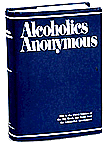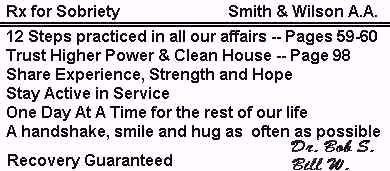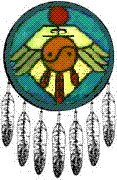

 Click The Images To Go To Page Indicated In The Flag The Second A.A. International Convention The International Convention in St. Louis in 1955 was perhaps the most important one ever held. It was the convention at which Bill announced that A.A. had now "come of age." The five year trial period for the General Service Conference plan was over, and this time Bill received no opposition to his plan. There were five thousand members with their families and friends in the audience. For three days they met to celebrate the twentieth anniversary of the founding of Alcoholics Anonymous. St. Louis was another centrally located city, and for Bill personally had the advantage that it was the hometown of Fr. Ed Dowling, his spiritual sponsor. In addition to Fr. Dowling, many other persons important to A.A. history were there: Rev. Sam Shoemaker; Dr. W.W. Bauer of the American Medical Association; Bernard Smith, then chairman of the General Service Board; penologist Austin MacCormick (between his two terms as trustee); Henry Mielcarek, corporate personnel expert, Dr. Jack Norris; and Dr. Harry Tiebout. Many of them addressed the convention and their talks are included in Alcoholics Anonymous Comes of Age. Dr. Leonard Strong, Bill's brother-in-law, couldn't make it to St. Louis, which disappointed Bill.
Bernard Smith chaired the convention. Nell wrote: Ebby Thatcher, whom Bill always called his sponsor, was there as Bill's special guest, brought up from Texas, where he had moved the year before. Another special guest in St. Louis was Bill's mother, Dr. Emily Strobell. She had divorced his father and left Bill with her parents when he was eleven years old, and, according to Nell, "Bill seemed desperate to seek his mother's approval all his life. ... He particularly wanted to have her with him at this special convention to hear him speak and see how the members and friends reacted to his contributions. Bill said it was 'the icing on the cake' for him." Nell added: "At the convention, I didn't see how Dr. Emily could have helped but be impressed with her son, but she didn't show too much reaction one way or the other." Lois, of course, was also there contributing her ideas, enthusiasm and energy, primarily concentrating on her Al-Anon Family Groups. On the Sunday afternoon of the closing "coming of age" part of the program, she was the first speaker in Kiel Auditorium after the vote to turn over leadership to the Fellowship had been taken. The second edition of the Big Book was published just in time for the St. Louis convention, and was designed to show the broader range of the membership. The original text of the first 11 chapters was unchanged, but Bill had worked hard to get new stories, often going to a group with the express purpose of taping the stories of various oldtimers. In addition to Bill's story and that of Dr. Bob, six others were carried over from the first edition; 30 new stories were included; and the present division of the story section into three parts was instituted. Bill gave three major talks. On the first night Bill talked of what he called the first of the three legacies: "How We Learned to Recover." His second talk dealt with the second legacy "How We Learned to Stay Together." His third talk was on the third legacy: "How We Learned to Serve." Four o'clock Sunday afternoon was reserved for the final meeting of the 1955 General Service Conference. This was the occasion on which Bill formally turned over the stewardship of A.A. to the General Service Conference, giving up his own official leadership and acknowledging that A.A. was responsible for its own affairs. He would later say: "Clearly my job henceforth was to let go and let God. Alcoholics Anonymous was at last safe -- even from me."
Robert Thomsen wrote: "He seemed to have grown, to be somehow a little larger than life, a man who just naturally created memories. If Bill W. had engaged a Madison Avenue, PR firm, one old-timer recalled, and if this firm had worked around the clock on his account, they could never have done for him what he without even trying did for himself that afternoon. There had always been a powerful affinity between Bill and the imagination of alcoholics, and now this could be felt in the farthest corners of Kiel Auditorium. "Even at a distance one got the impression of a tall, thin, completely relaxed man, yet with a tremendous inner energy; a personality that carried over big spaces -- that indeed seemed to expand when confronted with bigness. A warm light played over his face as he squared his shoulders and then leaned slightly forward across the lectern like some old backwoods statesman who'd stopped by for a chat. He was imposing, yet friendly, radiant but homespun." Bill wrote his history of this convention because he wanted to make sure that nobody misunderstood what had happened at St. Louis.
"Pass It On," p. 359 says: While Bill had stepped down at St. Louis, Dennis Manders, longtime controller at the General Service Office said "Bill would spend the next 15 years stepping down." Everybody -- including Bill -- was having difficulty letting go. Bill continued to write, multitudinous letters, plus "A.A.'s Twelve Concepts of Service" and the "A.A. General Service Manual," which together form a kind of constitution and a governmental structure of A.A. The A.A. Concepts don't have the elegance of A.A.'s Twelve Steps or its Twelve Traditions, nor are they well known to many A.A. members. The Twelve Concepts represent a unique and fascinating set of principles that derive the right of A.A.'s leaders to speak and act for the fellowship while establishing written guaranties for individual freedom and minority rights. The Concepts were conceived to protect the fellowship from becoming a top-down rather than a bottom-up organization. In June of 1958 he wrote to Sam Shoemaker: "St. Louis was a major step toward my own withdrawal [but] I understand that the father symbol will always be hitched to me. Therefore, the problem is not how to get rid of parenthood, it is how to discharge mature parenthood properly. "A dictatorship always refuses to do this, and so do the hierarchical churches. They sincerely feel that their several families can never be enough educated (or spiritualized) to properly guide their own destinies. Therefore, people who have to live within the structure of dictatorships and hierarchies must lose, to a greater or lesser degree, the opportunity of really growing up. I think A.A. can avoid this temptation to concentrate its power, and I truly believe that it is going to be intelligent enough and spiritualized enough to rely on our group conscience. "I feel a complete withdrawal on my part should be tried. Were any major structural flaws to develop later that I might help to repair, of course I would return. Otherwise, I think I should resolutely stay away. There are few, if any, historical precedents to go by; one can only see what happens. "This is going to leave me in a state of considerable isolation. Experience already tells me that if I'm within range of A.A. requests or demands, they are almost impossible to refuse. "Could I achieve enough personal freedom, my main interest would almost surely become these:
"(2) Throughout A.A., we find a large amount of psychic phenomena, nearly all of it spontaneous. Alcoholic after alcoholic tells me of such experiences and ask if these denote lunacy -- or do they have real meaning? These psychic experience have run nearly the full gamut of everything we see in the books. In addition to my original mystic experience, I've had a lot of such phenomenallism myself." The letter goes on to discuss this second item in great detail. The complete letter can be found on pages 373-376 of "Pass It On."
Bill and Dr. Jack Norris had some correspondence on the subject of Bill's responsibility as a living founder. Dr. Jack wrote:
Sources: Index of A.A. History Pages on Barefoot's Domain As in so many things, especially with we alcoholics, our History is our Greatest Asset!.. We each arrived at the doors of A.A. with an intensive and lengthy "History of Things That Do Not Work" .. Today, In A.A. and In Recovery, Our History has added an intensive and lengthy "History of Things That DO Work!!" and We will not regret the past nor wish to shut the door on it!!
KEEP COMING BACK!
On the Web Oct 26, 2002 in the Spirit of Cooperation Three mighty important things, Pardn'r, LOVE And PEACE and SOBRIETY |

